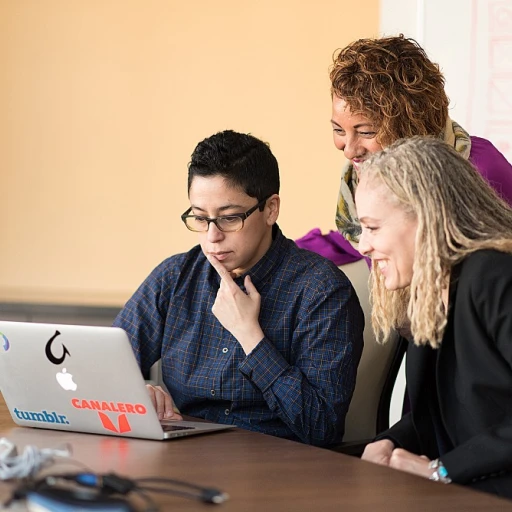
Understanding Board Development
Building a Strong Foundation for Leadership
The importance of understanding board development is paramount for organizations aiming to achieve a robust governance structure. At its core, board development serves as a vital component in enhancing the leadership capabilities of an effective board. For nonprofit organizations, this process becomes even more crucial as they often rely on dedicated individuals who volunteer their time and expertise.
Effective board development entails defining the roles and responsibilities of each board member clearly to ensure alignment with the organization's mission. This helps avoid any ambiguity that might arise during board meetings, thereby facilitating smoother operations and decision-making. Additionally, it encompasses the continuous support and training of members to enhance their skills and performance, which also contributes to successful fundraising and administration.
- Board Composition: A diverse and inclusive board can bring varied perspectives to discussions, making it more adaptable and innovative in addressing challenges.
- Long-term Planning: Establishing a cohesive development plan helps in identifying the key competencies required for future leaders, ensuring an uninterrupted succession and governance process.
- Best Practices: Implementing a development committee to oversee board activities can improve accountability and performance over time.
Understanding board development not only involves the structural aspects but also the dynamic nature of leadership within an organization. Identifying and nurturing these elements will significantly aid in building an ideals board equipped to support and drive forward the nonprofit organization's mission.
Identifying Key Competencies
Recognizing Critical Skill Sets and Roles
The cornerstone of impactful board development lies in recognizing the essential skills and roles that board members must embody. Within nonprofit organizations, the recognition of key competencies is vital not only to leverage the unique capabilities of each member but also to ensure alignment with the organization mission. Understanding these competencies facilitates better support of the board's strategic objectives and reinforces effective governance.
Ensuring that board directors possess a diverse set of skills enhances board performance significantly. These skills go beyond basic governance and extend into areas such as fundraising, financial acumen, and strategic planning. Effective board directors will also have robust communication abilities, essential for nurturing relationships within the board and with external stakeholders.
- Diverse Expertise: Having a varied skill set among board directors supports dynamic problem-solving and enhances long-term planning.
- Fundraising Acumen: Mastery in fundraising can accelerate the mission-driven goals of nonprofit organizations.
- Financial Oversight: Directors should exhibit strong skills in financial analysis to ensure organizational sustainability.
- Strategic Vision: The ability to foresee potential challenges and opportunities is paramount for future-proofing the organization.
Moreover, identifying these critical competencies allows the development committee to tailor the development plan, ensuring that skills enhancement aligns with the board's needs. Establishing training programs caters to fortifying these necessary skills and promotes continuous improvement in board meetings. Effective board development doesn't only react to current needs but anticipates future challenges by constantly refining board composition.
Nonprofit boards are encouraged to set clear roles and responsibilities, offering members a focused direction and underscoring areas requiring development. As a result, this proactive approach embraces bold leadership, which is an exemplary facet in any successful succession planning initiative. Cultivating these competencies is a perpetual process that will help organizations meet evolving expectations while reinforcing ideals board members strive towards.
Strategies for Effective Board Development
Implementing Tailored Training Programs for Board Members
Developing an effective strategy for board development requires a relentless focus on capacity-building initiatives that align with the organization's mission. This begins with creating a tailored training program that enhances the skills and capabilities of board members. Firstly, identifying the specific skills and competencies required by board members is critical to fostering an effective board. Aligning these competencies with the organization's long-term goals ensures that board members are well-prepared to support and propel the mission forward. This involves a thorough assessment of the current board composition to understand the gaps and strengths within the team. An impactful training program must be comprehensive, covering essential areas such as governance, fundraising, and strategic planning. Elements to be integrated include:- Workshops and Seminars: Organize frequent sessions to discuss best practices and insights related to board duties, encouraging continuous learning among board members.
- Role-Specific Training: Target particular roles and responsibilities, equipping members with the tools needed to fulfill their specific responsibilities effectively and ensuring board performance aligns with organization goals.
- Mentorship Programs: Establish a mentorship or peer-to-peer support system, enabling less experienced members to learn from seasoned board directors. This exchange of knowledge helps to maintain robust governance practices.
- Collaborative Initiatives: Encourage participation in collaborative initiatives with other nonprofit organizations or development boards, which offer diverse perspectives and broaden board members' understanding of governance challenges.
Challenges in Board Development
Overcoming Obstacles in Board Development
Developing an effective board is not without its challenges. Organizations, especially nonprofits, often face hurdles that can impede the growth and performance of their boards. Understanding these challenges is crucial for creating a robust development plan that aligns with the organization's mission and long-term goals.
Balancing Board Composition
One significant challenge is ensuring the right board composition. A diverse mix of skills, experiences, and perspectives is essential for effective governance. However, achieving this balance can be difficult. Organizations must be strategic in recruiting board members who not only bring the necessary skills but also align with the organization's ideals and mission. This requires a clear understanding of the roles and responsibilities each member will undertake.
Engaging Board Members
Engagement is another critical issue. Board members, particularly in nonprofit organizations, often juggle multiple commitments. Ensuring their active participation in board meetings and development activities is vital for maintaining board performance. Organizations can support engagement by offering training and development opportunities that enhance board members' skills and knowledge, thereby increasing their commitment to the board's mission.
Managing Board Dynamics
Interpersonal dynamics within the board can also pose challenges. Conflicts may arise due to differing opinions or unclear roles. Establishing a development committee can help manage these dynamics by fostering open communication and ensuring that all members are aligned with the board's goals. Regular performance evaluations and feedback sessions can also help in addressing any issues promptly.
Securing Resources for Development
Finally, securing adequate resources for board development is often a hurdle. Nonprofit organizations, in particular, may struggle with limited budgets. However, investing in board development is crucial for long-term success. Organizations can explore fundraising strategies or seek support from external partners to fund training and development initiatives. This investment will ultimately help in building a strong, effective board that can drive the organization forward.













